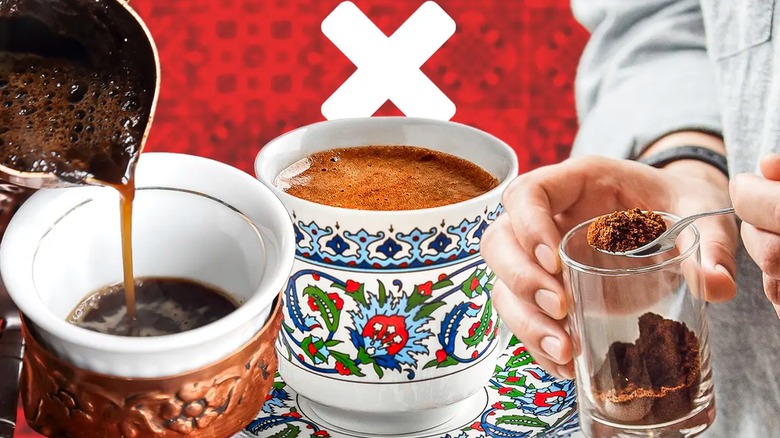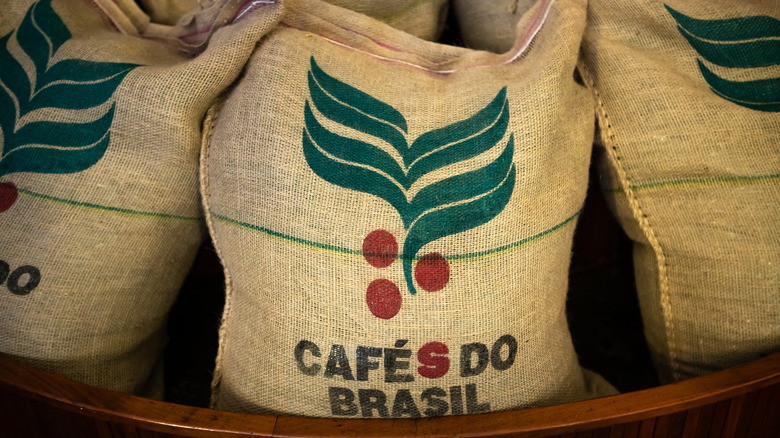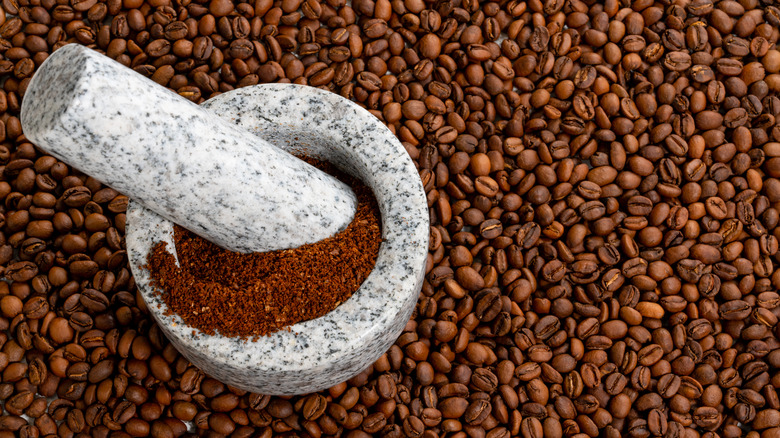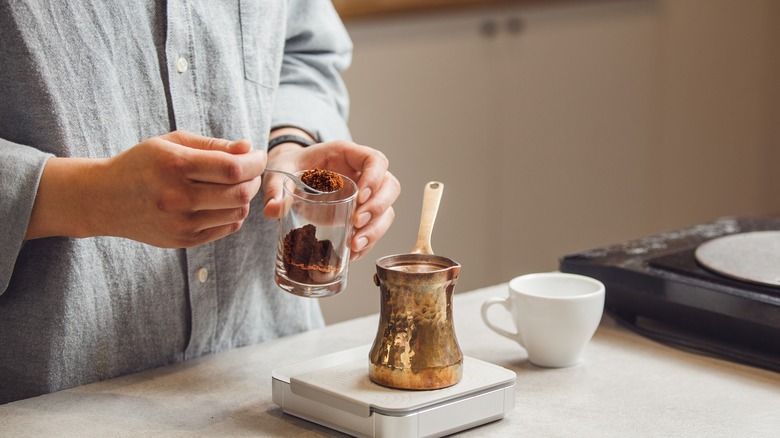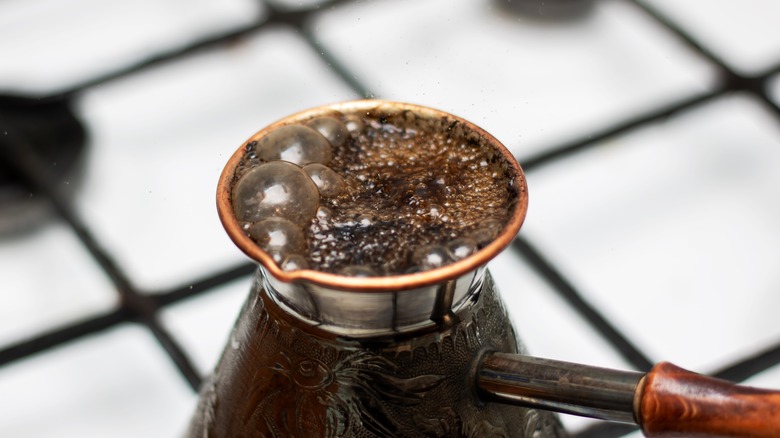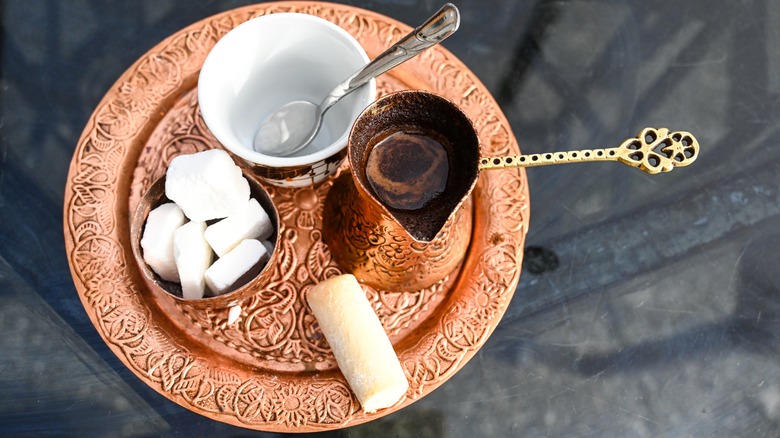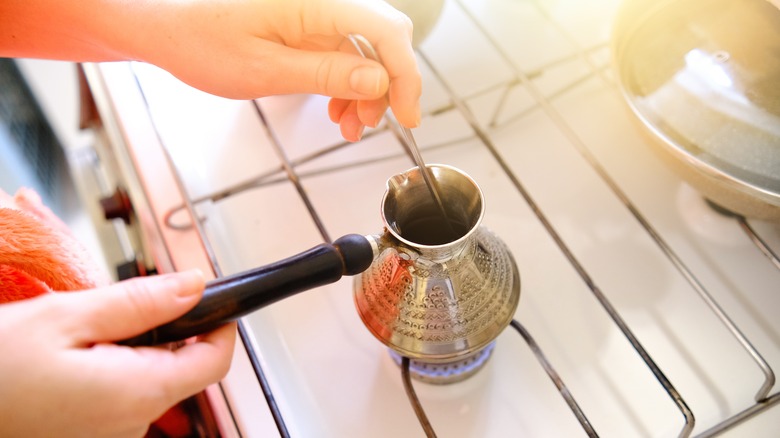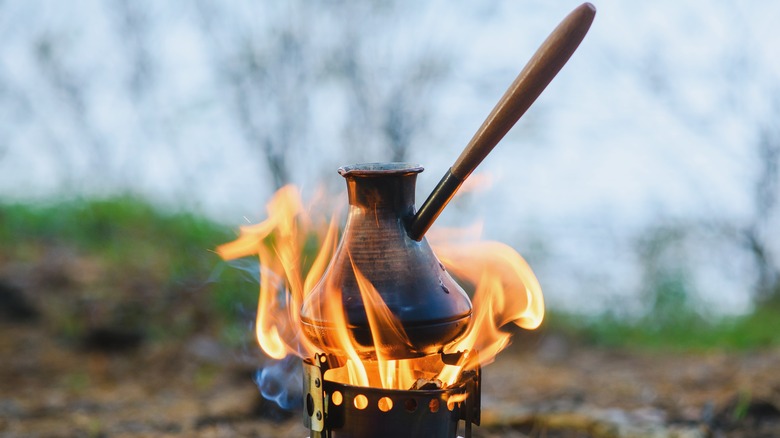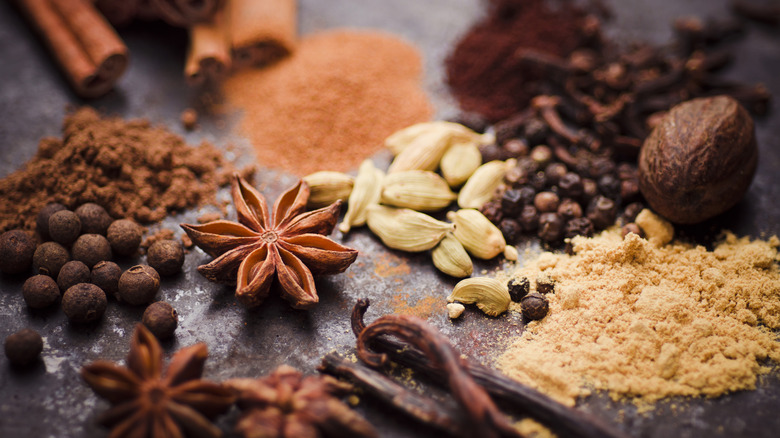9 Mistakes Everyone Makes With Turkish Coffee
Coffee comes in many glorious forms, all with regional ties and historical significance. Turkish coffee, starkly different from America's favorite drip brew, was first developed in Yemen back in the days of the Ottoman Empire. It eventually made its way to Istanbul by way of Syrian traders. As the coffee traveled North, and eventually worldwide, so did its cultural, spiritual, and sometimes even mystical significance.
Contrary to popular belief, Turkish coffee doesn't refer to coffee that originates in Turkey; rather, the title serves as a designation for the unique brewing method involving finely ground coffee heated with sugar and spices in a small, uniquely-shaped copper pot called an ibrik and served without straining the grounds from the cup.
Bhavi Patel, dairy technologist and coffee writer of Banjaran Foodie, spoke with me about brewing Turkish coffee, highlighting what she believes to be the most common blunders in the brewing process. Patel and I — a Turkish coffee lover with a decade of barista experience — combined our caffeine-fueled knowledge to curate this list for those attempting to make the coffee for the first time and those who have been experimenting with brewing and just can't seem to nail it. To create a cup of coffee that can whisk you off to a quaint Bedouin café, use this list as a guide to avoid the usual mistakes that ruin a cup of this unique and storied brew.
Not using Brazilian beans
A great cup of coffee can't be made without the right beans for the job. High-quality beans of a specific roast designed to complement other ingredients in the cup is essential, and this rings true for Turkish coffee, too. There's no designated roast level for the perfect Turkish brew; some prefer bright and light beans, while others believe the darker and richer, the better. What matters more than roast level is quality and origin of the beans.
Oddly enough, beans imported all the way from Brazil are the most popular choice in Turkey for brewing its traditional coffee. Brazilian arabica coffee is known around the world for its ashy, nutty, and sweet flavor. In Brazil, these beans are used for cafézinho — a dark brew regularly consumed throughout the country — but the beans are also a prominent feature in other traditional beverages. Brazilian arabica is low in acidity, making it ideal for powerful Turkish coffee, in which the finely ground beans remain in the cup even while consuming it. Unlike American drip — with flavors that vary widely from cup to cup — Turkish coffee is defined by a very particular taste that some might describe as medicinal. This medicinal taste is technically a defect — specifically dubbed the "Rio defect" — in Brazilian coffee, but like so many happy accidents, the error is now a sought-after feature and one that adds depth and character to Turkish coffee.
Grinding coffee to the wrong grind size
When it comes to making Turkish coffee, the size of the bean's grind plays a pivotal role. Unlike other brewing methods that are a little more forgiving, Turkish coffee requires very finely ground beans for a full-flavor cup. Fine-ground beans allow more water to reach the coffee, resulting in a bolder taste. "To make great Turkish coffee, you need to grind coffee to a very fine powder, similar to the consistency of powdered sugar or fine talcum powder," says Patel. "Grinding it this fine increases the surface area of the coffee grounds and helps extract the maximum possible flavors from it during the brewing process."
Back in the 16th century, when Turkish coffee was reserved for society's elite, the Sultan's staff would use a mortar and pestle to grind coffee into a fine powder. Today, this method is still practiced in more traditional homes and establishments, but using a blade or burr coffee grinder works just as well, as long as the grinder is high-quality and has the ability to grind coffee to an incredibly small grain.
Not using enough coffee
I'll be the first to tell you that brewing coffee without extracting the grounds is intimidating. It's common for first-timers to the world of Turkish coffee to skimp out on the amount of coffee grounds out of fear of too bitter and too strong a cup. I'm guilty of this devastating faux pas, and I'd like to say that I learned my lesson the first time, but I kept going back to adding too few grounds time and time again. In the West, we're used to a cup of coffee that is ultimately weaker than the brews of the East but served in a much larger cup to compensate for its lack of potency. Outside of North America, coffee looks much different; it's served in much smaller cups and brewed to be significantly stronger than American coffee. This rings true for Turkish coffee, which requires a hearty dose of coffee grounds in each cup to reach its maximum potential.
Although Turkish coffee's water-to-coffee ratio way seem irresponsible to those who are used to a big, steaming cup of weak drip coffee every morning, fear not; about two heaping teaspoons of coffee grounds for each 2.5 to 3-ounce cup is ideal and absolutely not taking it too far. Turkish coffee is characterized by its strength, which means you're better off using too much than too little in each cup, so don't be afraid to heavy hand it.
Boiling the water and burning the coffee
If you've ever seen videos of the aesthetically pleasing and relaxing process of brewing Turkish coffee, then you've likely marveled at the large bubbles that form when the coffee boils over. These videos imply that Turkish coffee is supposed to boil over, but in reality, the biggest mistake you can make with Turkish coffee is letting it boil at any point in the process. This rapid boil is more likely the result of the person brewing the coffee letting it sit for too long on the heat or using too high a temperature.
Patel says that Turkish coffee is best when it reaches a temperature of about 200 to 205 F and that you can go as low as 195 F if you prefer. She explains that if the coffee begins to boil, it burns the coffee grounds, resulting in an unpleasant, acrid cup.
Achieving the perfect temperature is no easy task. Ideally, you want to take the coffee off the heat just before it begins to boil so that it can be served as hot as possible before it burns. The best way to achieve this is to never leave the coffee's side as it's brewing. It only takes a couple of minutes to reach that sweet spot, so keep your eyes peeled — because, as the old adage goes, a watched pot never boils.
Adding sugar after brewing
The only time to add sugar to Turkish coffee is before the coffee is placed on the stove or other heating apparatus. This may seem strange, since most coffee is brewed before fixings like milk and sugar are added, but as we've already discovered, Turkish coffee doesn't play by regular coffee's rules.
Patel explains that because Turkish coffee doesn't require that the grounds be filtered out before consumption, adding sugar to the coffee after brewing would require stirring the coffee grounds in the demitasse along with the sugar. If the grounds are disturbed in the demitasse, each sip of coffee will be grainy and unpleasant. If you try to avoid this by not stirring the sugar in after brewing and simply leaving a lump of sugar to sit on the bottom of the demitasse, then your final sips will be overly sweet and ruin the sanctity of this historical and spiritually significant coffee. Adding sugar directly to the ibrik is the only way to circumvent this coffee-ruining mistake.
Although sugar is preferred among many coffee drinkers, it's not necessary for a great cup of Turkish coffee. If you're experimenting with this brewing method for the first time, try making a cup or two sans sugar first, that way you can experience the full flavor of the beans and natural sweetness of the spices to the fullest extent.
Disturbing the coffee too much during brewing
In videos of folks sitting street-side, brewing Turkish coffee until it boils over, you'll likely notice another faux pas if you observe closely: oftentimes, Turkish coffee is stirred, sometimes with rapid fervor, while it's sitting on the stove. Disturbing the coffee while it's brewing can lead to a reduction in taste and even aesthetic appearance, ultimately ruining your brew.
"When brewing Turkish coffee, you'll notice the foam forming on top of the water in the ibrik," says Patel. "This foam has an important role to play. [It's] a result of the trapped compounds inside the coffee grounds, quite like the crema that sits atop an espresso. The foam traps the aromatic molecules, giving the Turkish coffee a more nuanced, delicious aroma as well as a richer mouthfeel. So, don't disturb the ibrik too much during the brewing, and let the foam form."
Stirring is an important part of the process of making Turkish coffee, but it should only be done before the ibrik reaches the stove. Once the coffee grounds, water, and sugar have all been added, whisk away to allow for an even distribution of sugar and to ensure that the coffee grounds are spread out uniformly in the ibrik.
Using too high a heat for brewing
I get it — it's early in the morning, and you want your coffee ASAP. It's tempting to crank up the heat in an attempt to speed up the brewing process. This is absolutely fine with a coffee-brewing method that involves heating water before adding it to coffee (I turn my stove up to the max when I'm groggily making my French press coffee every morning), but then again, there's no need to avoid burning plain water. When it comes to Turkish coffee, low and slow is the way to go. And by low and slow, I really mean medium and medium — heat and speed, that is. Typically, it takes about seven to 10 minutes to brew Turkish coffee, and the stove should always be set to medium heat.
"Brewing coffee requires patience; for coffee lovers, it's a meditative process," says Patel. "Brewing should never be rushed, and brewing a Turkish-style coffee is no exception. If you try to use very high heat while brewing, you could end up with uneven extraction, unpalatable bitterness in the coffee, a weak cup, and even burnt grounds. [...] Let the coffee work its magic slowly [...] and give you a delicious cup [...]. All good things take time!"
Speeding up the process with high heat can also ruin your Turkish coffee's delicate foam — arguably the most important aspect of this time-honored beverage. A lack of foam means a less pleasant mouthfeel and a reduction in overall quality.
Forgetting the spices
The effects of the spice trade in the Middle East during the 16th century Ottoman Empire can still be felt today. Turkey and surrounding countries are still known for their spices, making a cup of traditional coffee spiked with native florals and aromatics all the more authentic. While Turkish coffee doesn't necessarily have to contain spices, the inclusion of tastes outside of just strong coffee helps to tone down its bitterness while adding layers of nuanced flavors.
Not just any spices you have lying around the kitchen will make a quality cup of traditional Turkish coffee. Sharp and slightly sweet cinnamon and cardamom are the most popular additions, with cloves and nutmeg sometimes sneaking their way in. My first cup of authentic Turkish coffee was loaded with cardamon, and ever since, I've been crafting the drink at home with the same quantities of this deliciously peppery and aromatic spice to capture the essence of the East. If you're tired of the tried-and-true spices, make a unique but still authentic cup with a touch of saffron or anise.
Patel recommends adding the spices to the ibrik while the coffee is brewing; not before or after. She says that whole spices also work, but grinding the spices beforehand is preferred for maximum flavor. If using whole spices, remove them just before pouring so that they don't take up too much space in your demitasse.
Drinking Turkish coffee on the go
Once you've perfected the process of brewing Turkish coffee, don't ruin your efforts by pouring the coffee into a to-go cup and rushing out the door. Not only is Turkish coffee delicious and synonymous with a nation's rich and storied past, but the humble beverage also plays a significant spiritual role.
In the West, we tend to optimize our daily tasks and rituals, always looking for the quickest, easiest way to get things done. In the East, it's often the opposite, and this cultural difference takes a tangible form in Turkish coffee. From its low-and-slow brewing process, intricate preparation methods, and the way in which it's designed to be consumed, everything about the drink is calming and ritualistic.
Make a plan to switch things up and go Turkish for your next morning cup of joe. Savor each step, from grinding the coffee (especially if using a mortar and pestle and not a noisy grinder) to slowly heating the ingredients and then delicately pouring the ibrik's contents into a tiny cup. Clear your mind and breathe easy, focusing only on the task at hand. You'll likely find that you feel more rejuvenated than ever, thanks to Turkish coffee's high caffeine content, of course, but also due to its ability to help you stay present and mindful.
